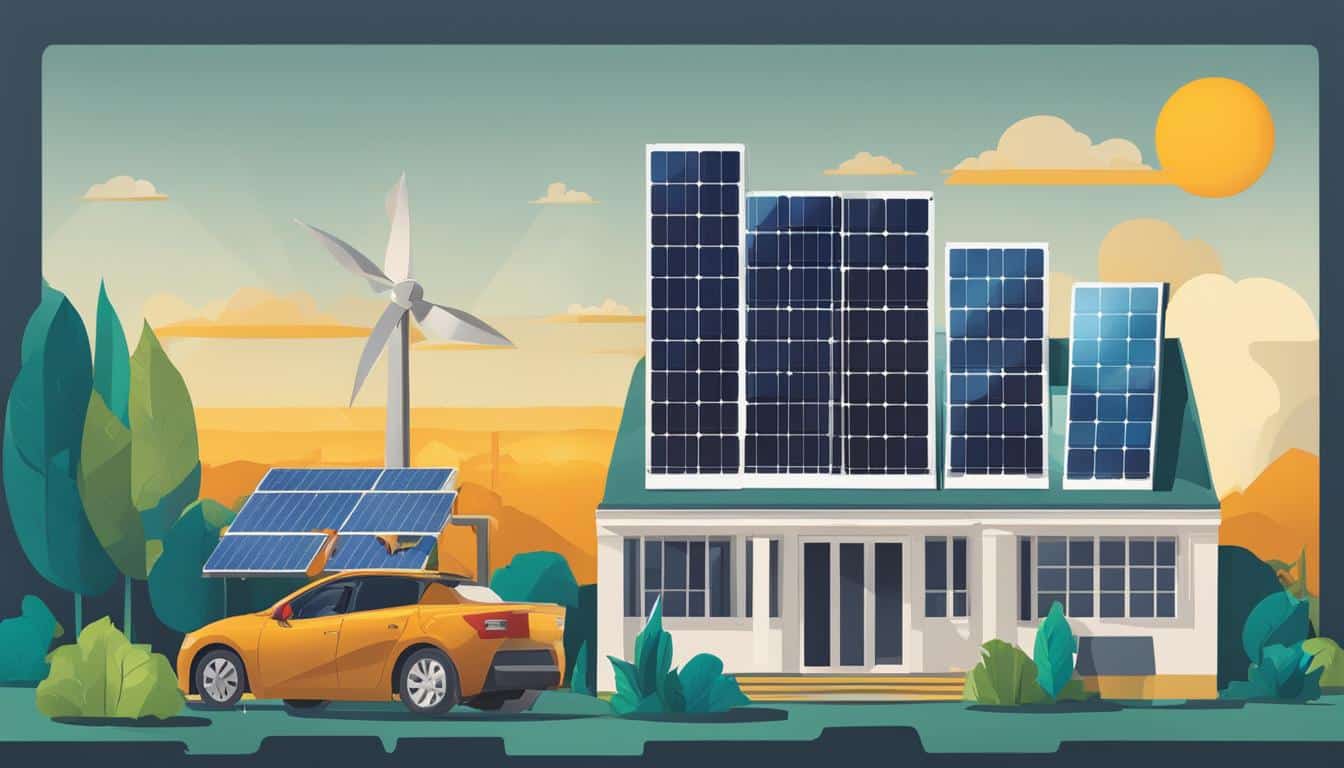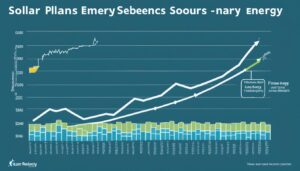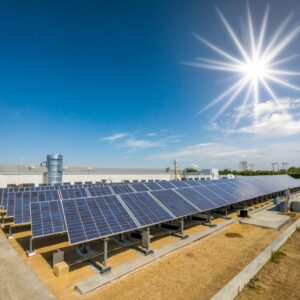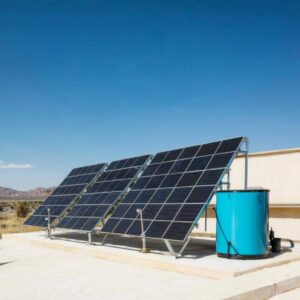
Exploring the different financing options available for solar projects is essential to ensure a bright financial path for your solar investment. Financing plays a crucial role in making solar projects accessible and affordable for homeowners, businesses, and organizations alike. By understanding the various financing options, you can choose the one that best suits your needs and maximizes the benefits of going solar.
Key Takeaways:
- Understanding the different financing options is crucial for making solar projects affordable and accessible.
- Solar loans allow you to borrow money to cover the upfront costs and pay it back over time.
- Solar leases and power purchase agreements (PPAs) provide options for going solar without upfront costs.
- Taking advantage of solar tax credits and incentives can significantly reduce the overall cost of your solar project.
- Solar Power Purchase Agreements (SPPAs) are long-term contracts for large-scale solar projects.
Understanding Solar Loans: A Popular Financing Option
When it comes to financing solar projects, solar loans are one of the most popular options available. These loans provide the necessary funds to cover the upfront costs of installing solar panels, allowing homeowners and businesses to embrace solar energy without a significant financial burden.
Solar loans typically offer competitive interest rates and flexible repayment terms, making them an attractive choice for those who want to go solar without paying the full cost upfront. With low-interest loans, you can spread out your payments over time, making it easier to manage your budget while reaping the benefits of solar energy.
Partnering with solar lenders who specialize in financing solar projects ensures that you receive the best loan terms, tailored to your specific needs. They understand the intricacies of solar financing and can guide you through the loan application process, making it a seamless experience.
Moreover, solar loans allow you to take advantage of various incentives and tax credits that are available for solar energy projects. This can further reduce the overall cost of your solar installation and enhance the financial benefits.
With solar loans, you become the owner of the solar panels, which means you are also eligible to benefit from the energy savings and potential income generated from excess electricity production.
The Benefits of Solar Loans:
- Lower upfront costs: Solar loans eliminate the need for a large upfront payment, making solar energy more accessible to homeowners and businesses.
- Flexible repayment terms: Solar loans offer flexible repayment options, allowing you to choose a repayment schedule that aligns with your financial situation.
- Competitive interest rates: With low-interest loans, you can enjoy the financial advantages of solar energy without breaking the bank.
Is a Solar Loan Right for You?
Before committing to a solar loan, it’s crucial to assess your unique financial situation and goals. Evaluate the following factors to determine if a solar loan is the right fit:
- Your budget and cash flow: Consider how a solar loan would affect your monthly budget and ensure that the loan payment is manageable within your financial means.
- Long-term financial goals: Determine if the financial benefits of solar energy align with your long-term financial goals, such as saving on utility bills and increasing the value of your property.
- Solar incentives and tax credits: Research the available solar incentives and tax credits in your area to understand how they can impact the overall cost of your solar project.
| Pros of Solar Loans | Cons of Solar Loans |
|---|---|
| Lower upfront costs | Monthly loan payment |
| Ownership of solar panels and benefits | Interest charges |
| Potential energy savings and income | Eligibility criteria and credit requirements |
Exploring Solar Leases and Power Purchase Agreements (PPAs)
When it comes to financing your solar project, two alternative options that eliminate the need for upfront costs are solar leases and power purchase agreements (PPAs). These financing methods allow you to embrace solar energy without the burden of significant upfront expenses.
Solar Leases: With a solar lease, you have the opportunity to lease the solar panels and pay a fixed monthly fee for the use of the system. This arrangement typically includes maintenance and monitoring services, ensuring that your solar panels operate optimally throughout the lease period.
Power Purchase Agreements (PPAs): In a PPA, a third-party provider installs and maintains the solar panels on your property. Instead of purchasing the system outright, you agree to buy the electricity generated by the solar panels at a predetermined rate. This allows you to enjoy the benefits of solar energy without the responsibility of system ownership or maintenance.
Both solar leases and PPAs are viable options for individuals or businesses who may not have the financial means to invest upfront in solar energy systems. These financing arrangements provide a more accessible pathway to going solar and reaping the long-term benefits of renewable energy.
By exploring solar leases and power purchase agreements, you can overcome the financial barriers associated with solar installations and make a positive impact on the environment. Take advantage of these innovative financing options to embark on a sustainable energy journey and secure a brighter future.

Advantages of Solar Leases and PPAs
- Elimination of upfront costs
- Access to affordable solar energy
- Inclusion of maintenance and monitoring services
- Reduction of electricity bills
- Long-term savings on energy costs
- Positive environmental impact
“By exploring solar leases and power purchase agreements, you can overcome the financial barriers associated with solar installations and make a positive impact on the environment.”
Taking Advantage of Solar Tax Credits and Incentives
The adoption of solar energy is not only beneficial for the environment but also financially advantageous, thanks to various tax credits and incentives offered by the federal and state governments. These incentives aim to make solar energy more accessible and affordable, encouraging individuals and businesses to invest in renewable energy.
One of the most significant incentives available is the Federal Investment Tax Credit (ITC). With the ITC, you can deduct a percentage of the cost of your solar project from your federal taxes. This credit helps offset the initial investment and significantly reduces the overall cost of going solar.
Additionally, many states offer their own solar incentives to further support renewable energy adoption. These incentives can include rebates, grants, and even property tax exemptions. By taking advantage of state-specific incentives, you can maximize the financial benefits of your solar project and potentially save thousands of dollars.
“The financial benefits of solar tax credits and incentives can make a significant difference in the overall affordability of your solar project.”
| Type of Incentive | Description |
|---|---|
| Solar Tax Credits | These credits allow you to directly deduct a portion of your solar project costs from your tax liability. |
| Rebates | Rebates provide a cash refund or direct payment for a specified percentage of your solar project costs. |
| Grants | Grants offer financial assistance to help cover a portion of your solar project expenses, reducing the upfront cost. |
| Property Tax Exemptions | Property tax exemptions relieve you from paying additional property taxes on the added value of your solar project. |
Understanding and leveraging these solar tax credits and incentives can result in substantial savings and accelerate the return on your solar investment. It is important to research and familiarize yourself with the specific incentives available in your state or region to fully capitalize on the benefits they provide.

Exploring Solar Power Purchase Agreements (SPPAs)
Solar Power Purchase Agreements (SPPAs) provide an innovative and cost-effective solution for businesses, governments, and utilities to procure renewable energy without the need for upfront investment. Under an SPPA, the solar developer takes on the responsibility of installing, owning, and operating the solar system, while the consumer benefits from a stable and predictable source of solar energy. By entering into a long-term contract, consumers can secure renewable energy at a predetermined rate, ensuring a reliable and sustainable power supply.
With solar power purchase agreements, consumers can enjoy numerous advantages. Firstly, SPPAs eliminate the significant upfront costs associated with solar system installation, making solar energy accessible to a wider range of customers. Secondly, SPPAs offer long-term price stability, reducing the risks of fluctuations in energy costs. This predictability allows businesses and utilities to better plan their budgets and financial forecasts.
Furthermore, SPPAs provide consumers with a hassle-free renewable energy procurement process. The solar developer is responsible for all aspects of system installation, operation, and maintenance, relieving consumers from any operational burden. This allows businesses and organizations to focus on their core activities while enjoying the environmental and financial benefits of solar energy.
Additionally, by adopting SPPAs, consumers contribute to the global shift towards sustainable energy sources. Solar power is a clean and renewable energy option that helps reduce carbon emissions and mitigates the effects of climate change. By supporting solar development through SPPAs, consumers play an active role in driving the transition to a greener future.
The Advantages of Solar Power Purchase Agreements:
- Eliminates upfront costs of solar system installation
- Provides long-term price stability
- Relieves consumers from operational responsibilities
- Contributes to a sustainable and low-carbon future
Overall, Solar Power Purchase Agreements (SPPAs) offer a viable and attractive solution for businesses, governments, and utilities seeking to procure renewable energy. By leveraging the expertise of solar developers and benefiting from predictable energy costs, consumers can embrace sustainable practices while reducing their environmental impact and enjoying the financial benefits of solar energy.
| Advantages | Disadvantages |
|---|---|
| Eliminates upfront costs | Long-term commitment |
| Price stability | Limited flexibility |
| Hassle-free procurement process | Reliance on the solar developer |
| Contributes to sustainability |
Conclusion
After exploring the various financing options for solar projects, it is clear that choosing the right option is crucial for the success and financial benefits of your solar investment. By considering solar loans, leases, power purchase agreements, and taking advantage of tax credits and incentives, you can make solar energy more accessible and affordable for your home or business.
Each financing option has its unique advantages and considerations. Solar loans offer flexibility with competitive interest rates, allowing you to pay for your solar system over time. Solar leases and power purchase agreements provide an opportunity to go solar without upfront costs, making it a viable solution for those who need more financial flexibility. Additionally, taking advantage of tax credits and incentives can significantly reduce the overall cost of your solar project, making it more financially appealing.
In conclusion, evaluating your needs and financial goals is crucial when choosing a financing option for your solar project. Consider the long-term financial benefits, the ease of repayment, and the potential savings on your energy bills. With the right financing in place, going solar becomes a smart investment for both the environment and your bottom line.
FAQ
What are the different financing options for solar projects?
Solar projects can be funded through various financing options such as solar loans, solar leases, power purchase agreements (PPAs), and taking advantage of solar tax credits and incentives.
What are solar loans?
Solar loans allow homeowners and businesses to borrow money to cover the upfront costs of their solar projects and pay it back over time. These loans often come with competitive interest rates and flexible repayment terms.
What are solar leases and power purchase agreements (PPAs)?
Solar leases involve leasing solar panels and paying a fixed monthly fee for their use, while PPAs allow a third-party provider to install and maintain the panels on your property, and you agree to purchase the generated electricity at a predetermined rate.
What are the tax credits and incentives available for solar projects?
The Federal Investment Tax Credit (ITC) allows you to deduct a portion of the solar project’s cost from your federal taxes. Additionally, many states offer their own incentives such as rebates, grants, and property tax exemptions.
What are solar power purchase agreements (SPPAs)?
Solar Power Purchase Agreements (SPPAs) are long-term contracts between solar developers and consumers that enable businesses, governments, and utilities to procure solar energy without upfront investment. The developer installs, owns, and operates the system, while the consumer purchases the electricity at a predetermined rate.








